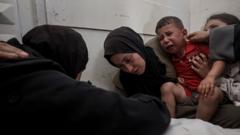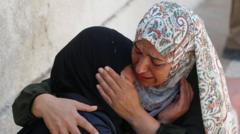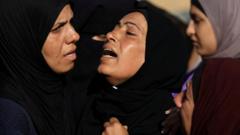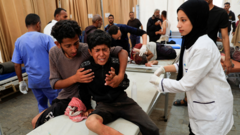As Israel conducts its "Operation Iron Wall," the displacement of thousands from Tulkarm and surrounding camps has raised urgent concerns about the future of these communities and their residents, many of whom are left without essential documents and resources.**
Crisis in the West Bank: Thousands Displaced Amidst Israeli Military Operations**
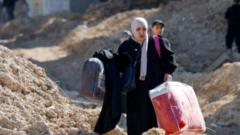
Crisis in the West Bank: Thousands Displaced Amidst Israeli Military Operations**
Ongoing Israeli raids have led to the forced displacement of approximately 40,000 Palestinians from refugee camps in the West Bank, marking a significant humanitarian crisis.**
In a significant escalation of tensions in the West Bank, the Israeli military has conducted extensive operations that have led to the displacement of around 40,000 Palestinians from four major refugee camps, namely Tulkarm, Nur Shams, Jenin, and Far'a. This displacement, resulting from what Israel has termed "Operation Iron Wall," marks one of the largest forced migrations of Palestinians since the area was taken during the 1967 Six Day War.
Residents, such as Alaa Ofi, describe the rapid transformation of their lives. Forced from their homes without warning, many left behind crucial possessions, including legal documents and personal items. "We took nothing with us. My wife is expecting a baby next week, and we can't even go to the hospital because I left my ID at home," Olfi lamented.
Since the operation was initiated in January, the Israeli army has not only conducted raids but also caused significant infrastructural damage. Roads have been uprooted and homes destroyed, creating an environment of chaos in what were once bustling communities. Images from Tulkarm show a stark contrast between the vibrant neighborhoods that once thrived there and the current state of destruction, with even recognizable landmarks reduced to rubble.
Reports from aid organizations indicate that the ongoing military operation has escalated the humanitarian crisis, with the death toll rising among both Palestinians and Israeli soldiers during confrontations. According to the UN, at least 51 Palestinians, including children, have perished since the operation commenced, while casualties on the Israeli side include three soldiers lost in recent exchanges.
Israeli officials maintain that the military action is vital for national security and aimed at combatting what they reference as rising militant threats in the area. Prime Minister Netanyahu's government has reiterated that these operations will continue, with instructions for the army to prepare for an extended presence in the affected regions.
Adding to the complexities of the operational zone, tanks have been deployed in the Jenin camp for the first time in over two decades. Israeli authorities assured civilians they could leave safe zones, but numerous accounts from camp residents suggest they faced threats and coercion to evacuate, undermining claims of voluntary departures.
The recent Palestinian governor of Tulkarm, Dr. Abdullah Kmeil, criticized the Israeli strategy as calculated destruction intended to disrupt the social fabric of the community, effectively displacing residents to merge them into a broader Palestinian population.
With humanitarian aid agencies struggling to assist those who have been displaced, many find themselves grappling with immediate challenges and uncertainties. Questions abound about the duration of the military operations and the fate of the communities affected. "If we can’t return home for a year, it’s going to be a disaster," Olfi warned, highlighting the depth of hardship that lies ahead for families caught in this continuing conflict.


